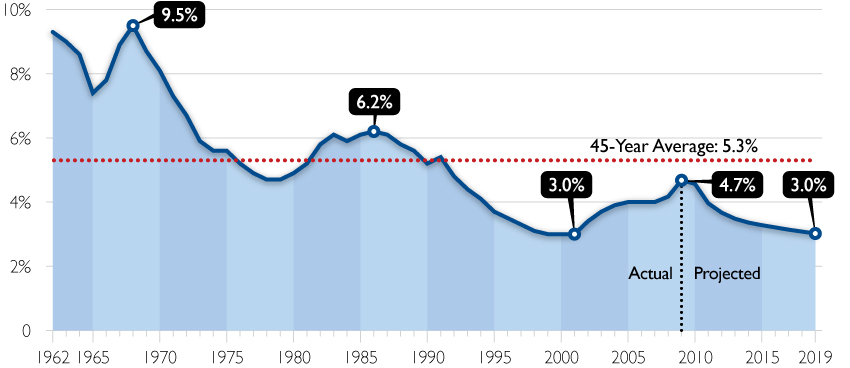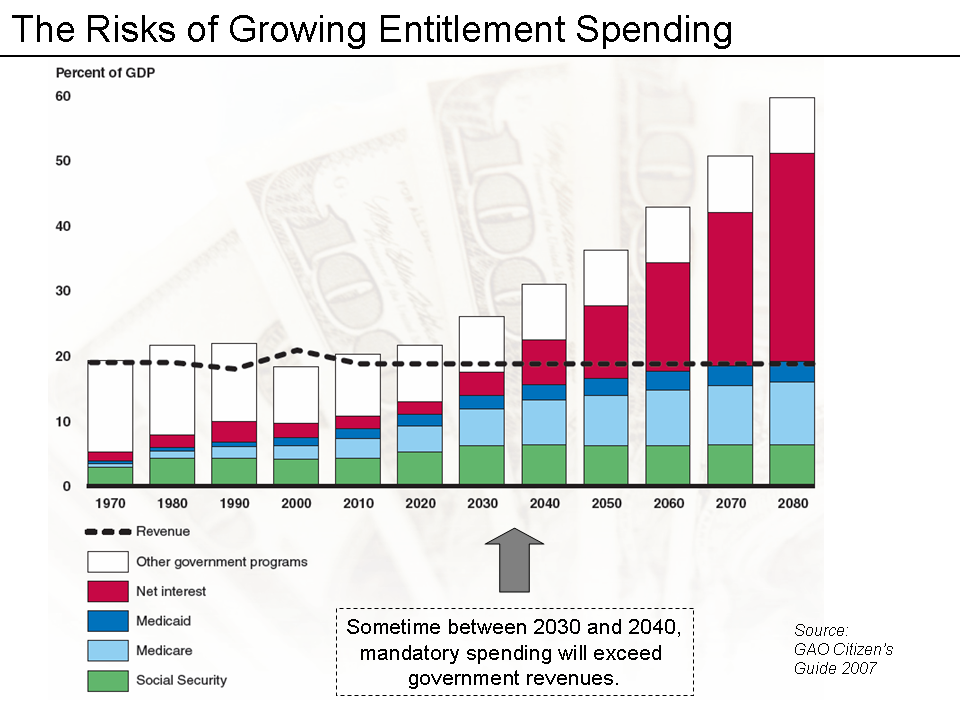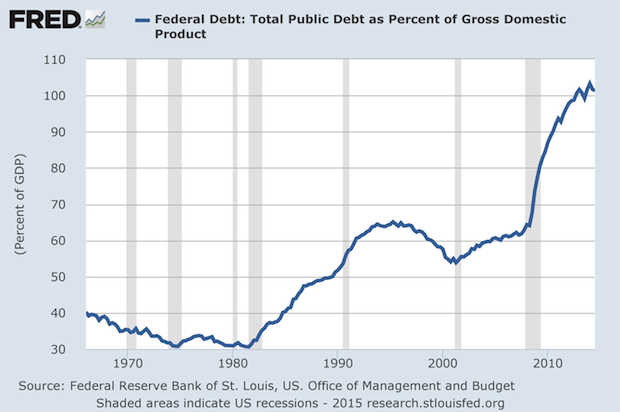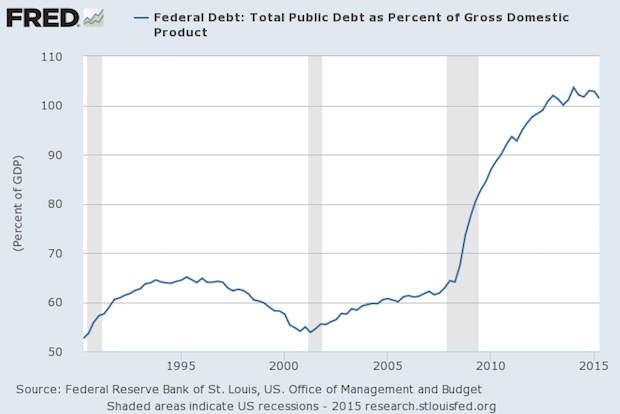We spend over half a trillion a year in Military spending!!!!!!!1111
Page 2 - Seeking answers? Join the AnandTech community: where nearly half-a-million members share solutions and discuss the latest tech.
You are using an out of date browser. It may not display this or other websites correctly.
You should upgrade or use an alternative browser.
You should upgrade or use an alternative browser.
alcoholbob
Diamond Member
- May 24, 2005
- 6,271
- 323
- 126
You miss the part where the dollar has lost more than half its value in the last 10 years? You simply aren't getting the same for your dollar as we did in 2003. The actual military today is far smaller than it was in 2003, the army has lost several combat brigades, the marines have downsized, the navy deploys 40% less carrier battle groups at any time now. Yeah, we spend too much because the economy honestly doesn't support this level of spending, but its a completely different argument to be saying that that military is too big in relation to the past. We aren't, the military is far smaller than it was a decade ago.
Last edited:
I have personally found that whatever type of government spending someone likes suddenly magically also creates jobs. Everyone paints their preferred spending in this light I think.
The difference is that the rest of the time conservatives argue that government spending cannot create jobs, that it's inherently wasteful, etc. You can't have it both ways. I would simply prefer they be honest with themselves and us and either admit that government spending does create jobs or that they prefer military spending despite the perceived job loss.
The sad part is, of course, that military spending is perhaps the lowest return on investment we are likely to get. Yes it has big benefits in some cases, but my strong suspicion is in terms of total quality of life for the average citizen we would be much better off with a lot of that money going to roads, hospitals, education, or lower taxes.
Couldn't agree more. I wonder what the invention, I think it was by Gore, of the internet has paid into our tax coffers,
BonzaiDuck
Lifer
- Jun 30, 2004
- 15,722
- 1,455
- 126
We don't spend enough on our military.
Around 2008 or '09, we were spending roughly 10 times more than the Chinese, and about several times more than the entire world combined, including our allies. If I'm wrong about the exact ratios, the data is out there, but we're still talking about 10 times the Chinese: They were spending about $60B/annum while we spent $600B/annum.
There's as much of a danger in the sloppiness of contract management as there is in spending too much, because you would then wonder about your own efficiency and effectiveness as opposed to some potential adversary.
Around the 2012 election, I'd seen numbers closer to $800B in 2008 with the wars winding down, and Amy Kremer of the Tea Party was whining "We need more . . . more . . . more!" The administration had already lowered the spending over that interim.
Before Bush took office, I think DOD outlays were some $250B to $300. They'd been higher than $350 at Cold War's end during Bush 41; Clinton trimmed it. David Stockman, Reagan's former budget director, argued that there was never any post-Cold-War disarmament.
And -- right -- "screw the highways, the schools, food and drugs, national health institutes and all the rest of it -- increase military spending but drown the rest of it in a bathtub."
I'm less worried about terrorists than I am about half-witted thinking right here in America.
Last edited:
You miss the part where the dollar has lost more than half its value in the last 10 years? You simply aren't getting the same for your dollar as we did in 2003. The actual military today is far smaller than it was in 2003, the army has lost several combat brigades, the marines have downsized, the navy deploys 40% less carrier battle groups at any time now. Yeah, we spend too much because the economy honestly doesn't support this level of spending, but its a completely different argument to be saying that that military is too big in relation to the past. We aren't, the military is far smaller than it was a decade ago.
The dollar has lost more than half its value? You have to be joking. $100 in 2005 is worth about $121 today, not $200+. What fantasy numbers are you using?
Once you see that your fundamental numbers are way off the rest of your post doesn't make much sense.
alcoholbob
Diamond Member
- May 24, 2005
- 6,271
- 323
- 126
The dollar has lost more than half its value? You have to be joking. $100 in 2005 is worth about $121 today, not $200+. What fantasy numbers are you using?
Once you see that your fundamental numbers are way off the rest of your post doesn't make much sense.
By looking at the prices of US military equipment. An M1 Abrams tank in 2003 was $4.3 million, today it's $8.58 million. Are you honestly using the CPI to compare inflation in US heavy industries? The CPI doesn't also track healthcare costs, housing costs, education costs, or anywhere else federal dollars are getting funneled, and saying the dollar doesn't get you as far in any of those areas is just as valid. I'm honestly surprised you would use that as an argument. Are you a pure keynesian? As you in even consider the Federal Reserve's use of the quantity theory of money as bad economics?
Last edited:
By looking at the prices of US military equipment. An M1 Abrams tank in 2003 was $4.3 million, today it's $8.58 million. Are you honestly using the CPI to compare inflation in US heavy industries? I'm honestly surprised you would use that as an argument.
I'm honestly baffled that you would use procurement costs for a single system to measure US military spending cost inflation. Especially one that comprises such a tiny portion of overall spending.
I think you're correct, I could also have sworn that SS, Medicare etc. makes a HUGE chunk. So what is this chart?
As someone else already posted, it's discretionary spending. It ignores mandatory spending on entitlements.




As you can tell from this chart, projections made in 2007 are no longer valid as the debt (and therefore the cost of servicing it) has risen.
tl;dr - a military fire sale would not halt our current trajectory.

Last edited:
alcoholbob
Diamond Member
- May 24, 2005
- 6,271
- 323
- 126
I'm honestly baffled that you would use procurement costs for a single system to measure US military spending cost inflation. Especially one that comprises such a tiny portion of overall spending.
That's one example. I don't have all day to google procurement costs just to respond to a snarky poster who obviously enjoys hit and runs. A 100,000 ton CVN carrier was $4.5 billion back in 2003, it's now $10.44 billion as of 2013. Are you just arguing semantics with me now? It seems like you just noticed something that wasn't worded to your liking and decided to attack it.
Last edited:
crashtech
Lifer
- Jan 4, 2013
- 10,524
- 2,111
- 146
Statistics are easily manipulated to in turn manipulate people who already want to believe a particular thing, that much is certain.
But a case can be made that we are overshot on defense spending. Playing world police doesn't come cheap. A look at per capita spending shows us far ahead of any potential rival, but wow, look at Saudi Arabia! Scary.
https://en.wikipedia.org/wiki/List_of_countries_by_military_expenditure_per_capita
In absolute numbers, we could add up most of our closest competitors, allies and rivals alike, and they still don't come close to us.
https://en.wikipedia.org/wiki/List_of_countries_by_military_expenditures
But a case can be made that we are overshot on defense spending. Playing world police doesn't come cheap. A look at per capita spending shows us far ahead of any potential rival, but wow, look at Saudi Arabia! Scary.
https://en.wikipedia.org/wiki/List_of_countries_by_military_expenditure_per_capita
In absolute numbers, we could add up most of our closest competitors, allies and rivals alike, and they still don't come close to us.
https://en.wikipedia.org/wiki/List_of_countries_by_military_expenditures
Last edited:
That's one example. I don't have all day to google procurement costs. A 100,000 ton CVN carrier was $4.5 billion back in 2000, it's now $10.50 billion. Are you just arguing semantics with me now? It seems like you just noticed something that wasn't worded to your liking and decided to attack it.
Procurement costs are about 20% of the military budget, and the carriers built today isn't even of the same class as the Reagan (ford class vs nimitz). It is a new platform, which means higher initial costs, and it is a vastly more capable platform than it was in 2000. You aren't comparing apples to apples.
I'm arguing that your idea is entirely wrong because it is based on an estimate of overall military spending based on procurement costs which are not only a relatively small part of the budget but compare different things over time without understanding them and without understanding CPI.
BonzaiDuck
Lifer
- Jun 30, 2004
- 15,722
- 1,455
- 126
I'm honestly baffled that you would use procurement costs for a single system to measure US military spending cost inflation. Especially one that comprises such a tiny portion of overall spending.
If it's a single observation, it's not a statistical observation based on a sample of several. And I'm not even suggesting a suspicion that our colleague is cherry-picking, but the method offers plenty of opportunity.
A defense contract from start to finish isn't a market process. The initial selection and the contract-type, like "cost-plus-fixed-fee", is a process with a much bigger variety of outcomes and error than the daily commodity price of potatoes.
I have personally found that whatever type of government spending someone likes suddenly magically also creates jobs. Everyone paints their preferred spending in this light I think.
The difference is that the rest of the time conservatives argue that government spending cannot create jobs, that it's inherently wasteful, etc. You can't have it both ways. I would simply prefer they be honest with themselves and us and either admit that government spending does create jobs or that they prefer military spending despite the perceived job loss.
The sad part is, of course, that military spending is perhaps the lowest return on investment we are likely to get. Yes it has big benefits in some cases, but my strong suspicion is in terms of total quality of life for the average citizen we would be much better off with a lot of that money going to roads, hospitals, education, or lower taxes.
Couldn't agree more. I wonder what the invention, I think it was by some DARPA scientist named Gore, of the Internet has paid into our tax coffers.
BonzaiDuck
Lifer
- Jun 30, 2004
- 15,722
- 1,455
- 126
Here's an opinion by David Stockman, hyping Eisenhower, with mild criticism of Obama, or maybe subtle posturing.
http://www.theglobalist.com/yes-we-can-how-eisenhower-wrestled-down-the-u-s-warfare-state/
I think Ike suggested a rule-of-thumb for <=5% of GDP for Cold War spending.
I also think, as with the very real phenomenon of economies of scale, that the exact figure for the GROWTH in defense spending might actual be adequate at a lower level. And -- with more honesty than Donald Trump, I'll say I could be wrong.
But I'm pretty sure that what happened between 2001 and 2008 was off the charts. And that's where we are, for mild cutbacks after the biggest spending on the wars.
http://www.theglobalist.com/yes-we-can-how-eisenhower-wrestled-down-the-u-s-warfare-state/
I think Ike suggested a rule-of-thumb for <=5% of GDP for Cold War spending.
I also think, as with the very real phenomenon of economies of scale, that the exact figure for the GROWTH in defense spending might actual be adequate at a lower level. And -- with more honesty than Donald Trump, I'll say I could be wrong.
But I'm pretty sure that what happened between 2001 and 2008 was off the charts. And that's where we are, for mild cutbacks after the biggest spending on the wars.
Last edited:
Try again
The 'we can do this because our economy is bigger' only works on spending a smaller %, not more.
If you notice a lot of the countries that are smaller as a % also fall under our protection. Germany, UK, Italy, Japan. They all have the US taxpayer funding their defense. If we stopped housing an army in Europe the % of GDP spent by these countries would rise and ours fall. But 3% of GDP is not out of line for military spending.
Last edited:
Even Obama kept the status quo. Shit if we cut a little of that spending I can see college for everyone being free.
Defense spending is a jobs program so you'll find many Democrats balk at cutting spending when it affects their area of representation. Army says it doesn't want more tanks starting back in 2012? Too bad because Republican Jim Jordan and Democrat Sherrod Brown are going to force you to keep buying things you don't need or want
We can get back to 2003 levels at least. I find it hard to believe that in 12 years we had to double it.
We are gonna end up like the Soviet Union if we keep at it.
Doesn't look like its adjusted for inflation so using the BLS CPI inflation calculator the equivalent spending to 2003 would be ~$581 billion in today's dollars. Looks like todays numbers are within 5-7% of that
flexy
Diamond Member
- Sep 28, 2001
- 8,464
- 155
- 106
>>
[Europe] they all have the US taxpayer funding their defense.
>>
Funny
There sure would be more than a couple who would be happy if the US military would leave EU. (I am not one of those, by the way).
But the presence of the US here in EU, say, Germany, benefits YOU guys a lot more than it does us. (Stationed US weapons and bases, making us the likely very first targets in a conflict)
* Grafenwöhr (MAJOR training base for US Army in Europe)
* Rammstein etc.
* Missiles stationed in [who knows where]
The benefit is (mostly) yours since you need those major hubs in Europe for all your Middle East and other campaigns.
So for god's sake don't make it sound as that all you do here in EU is "funding our defense" when you clearly benefit most from your presence here.
[Europe] they all have the US taxpayer funding their defense.
>>
Funny
There sure would be more than a couple who would be happy if the US military would leave EU. (I am not one of those, by the way).
But the presence of the US here in EU, say, Germany, benefits YOU guys a lot more than it does us. (Stationed US weapons and bases, making us the likely very first targets in a conflict)
* Grafenwöhr (MAJOR training base for US Army in Europe)
* Rammstein etc.
* Missiles stationed in [who knows where]
The benefit is (mostly) yours since you need those major hubs in Europe for all your Middle East and other campaigns.
So for god's sake don't make it sound as that all you do here in EU is "funding our defense" when you clearly benefit most from your presence here.
Last edited:
>>
[Europe] they all have the US taxpayer funding their defense.
>>
Funny
There sure would be more than a couple who would be happy if the US military would leave EU. (I am not one of those, by the way).
But the presence of the US here in EU, say, Germany, benefits YOU guys a lot more than it does us. (Stationed US weapons and bases, making us the likely very first targets in a conflict)
* Grafenwöhr (MAJOR training base for US Army in Europe)
* Rammstein etc.
* Missiles stationed in [who knows where]
The benefit is (mostly) yours since you need those major hubs in Europe for all your Middle East and other campaigns.
So for god's sake don't make it sound as that all you do here in EU is "funding our defense" when you clearly benefit most from your presence here.
Oh we benefit from what you described. But if our military presence left over the course of years. The EU member nations would have to increase their own defense spending to make up for our lack of presence. Because the bear to the East would notice the shambles and lack of preparation many of the EU member state military situation are currently in.
WelshBloke
Lifer
- Jan 12, 2005
- 30,443
- 8,109
- 136
Try again
The 'we can do this because our economy is bigger' only works on spending a smaller %, not more.
If you rank it by % of GDP you are not that out of line. Yes you spend a lot, but its not massively more compared to your GDP.

WelshBloke
Lifer
- Jan 12, 2005
- 30,443
- 8,109
- 136
Oh we benefit from what you described. But if our military presence left over the course of years. The EU member nations would have to increase their own defense spending to make up for our lack of presence. Because the bear to the East would notice the shambles and lack of preparation many of the EU member state military situation are currently in.
France alone spends $62 billion, Russia spends $84 billion.
If you rank it by % of GDP you are not that out of line. Yes you spend a lot, but its not massively more compared to your GDP.
This of course raises the question of why military spending should need to scale with GDP.
WelshBloke
Lifer
- Jan 12, 2005
- 30,443
- 8,109
- 136
This of course raises the question of why military spending should need to scale with GDP.
It doesnt have to scale with anything.
But...
Big countries, with massive economies, have more interests that they need to protect.
BonzaiDuck
Lifer
- Jun 30, 2004
- 15,722
- 1,455
- 126
It doesnt have to scale with anything.
But...
Big countries, with massive economies, have more interests that they need to protect.
That's a worthy point.
There's also this:
" . . . In the councils of government, we must guard against the acquisition of unwarranted influence, whether sought or unsought, by the military-industrial complex. The potential for the disastrous rise of misplaced power exists and will persist. We must never let the weight of this combination endanger our liberties or democratic processes. We should take nothing for granted. . . . "
My interpretation of Eisenhower's warning focuses on the meaning of "military industrial complex."
Looking over it, it seems that he had the defense industry, its lobbyists, investors and war-profiteers in mind.
But oil by that time had become a "strategic mineral." Many of the investors of two-percenter status then and now had a practice of moving their money back and forth between defense-aerospace and oil.
People may have missed an important facet of the warning. Ike, by that time, had seen and experienced much: 500,000 or so US troops dead from the Normandy landing to the fall of Berlin; the wobbly, unbridled emergence of CIA and NSA in the early days of the Cold War; the growth of post-war, Cold-War-era spending and procurement.
He would've known how "unwarranted influence" might affect decisions to go to war and "unilateralism." And he would've had those 500,000 tombstones on his mind, no less -- the losses in Korea.
I also observe from some of the stats presented above that the amounts of spending by other countries have grown in ways that cannot be accounted for except as real dollar equivalents. And there is a logic to arms races.
There had been a time in the US where mythical thinking about the USSR abounded. "They're all Atheists:" not true -- Russian Orthodoxy is alive and well. "You couldn't own a gun in the USSR:" Hunting had always been a revered Russian pastime; a certain young man who returned to the US in 1961 was seen getting on a bus or trolley in Minsk with a shotgun under his arm -- a tongue-in-cheek recollection by someone interviewed by Norman Mailer for "Oswald's Tale." Today, Russian teenagers are being formed into quasi-ROTC groups, fiddling with AK-47's in their parents' kitchens -- to prepare for God-knows-what.
So on the one hand, there's the issue of spending. On the other hand, the short-term interests of those who profit from the spending, and the disastrous decisions that can be made by those under their influence.
TRENDING THREADS
-
Discussion Intel current and future Lakes & Rapids thread
- Started by TheF34RChannel
- Replies: 23K
-
Discussion Zen 5 Speculation (EPYC Turin and Strix Point/Granite Ridge - Ryzen 9000)
- Started by DisEnchantment
- Replies: 10K
-
Discussion Speculation: Zen 4 (EPYC 4 "Genoa", Ryzen 7000, etc.)
- Started by Vattila
- Replies: 13K
-
Discussion Intel Meteor, Arrow, Lunar & Panther Lakes Discussion Threads
- Started by Tigerick
- Replies: 7K
-

AnandTech is part of Future plc, an international media group and leading digital publisher. Visit our corporate site.
© Future Publishing Limited Quay House, The Ambury, Bath BA1 1UA. All rights reserved. England and Wales company registration number 2008885.

